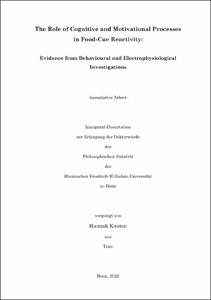Kirsten, Hannah: The Role of Cognitive and Motivational Processes in Food-Cue Reactivity : Evidence from Behavioural and Electrophysiological Investigations. - Bonn, 2022. - Dissertation, Rheinische Friedrich-Wilhelms-Universität Bonn.
Online-Ausgabe in bonndoc: https://nbn-resolving.org/urn:nbn:de:hbz:5-68281
Online-Ausgabe in bonndoc: https://nbn-resolving.org/urn:nbn:de:hbz:5-68281
@phdthesis{handle:20.500.11811/10365,
urn: https://nbn-resolving.org/urn:nbn:de:hbz:5-68281,
author = {{Hannah Kirsten}},
title = {The Role of Cognitive and Motivational Processes in Food-Cue Reactivity : Evidence from Behavioural and Electrophysiological Investigations},
school = {Rheinische Friedrich-Wilhelms-Universität Bonn},
year = 2022,
month = oct,
note = {Overeating triggered by food cues is assumed to contribute to the rising numbers of overweight and obesity in obesogenic environments. Thus, food-cue reactivity has become a growing research topic. This thesis aims to contribute to a deeper understanding of cognitive and motivational processes involved in food-cue reactivity. In four studies, attentional, motivational, and learning processes in the context of food-cue processing and food choices were investigated. In Study I, food-elicited modulations of the attentional blink have revealed evidence for prioritised attentional processing of food cues. In Study II, event-related potentials (ERPs) of emotion-induced blindness elicited by food cues have indicated early attentional capture by task-irrelevant food stimuli. Further ERP evidence in Study III has shown that sustained attention towards food cues is affected by the food’s calorie content and by the situational context in which food choices are made. Moreover, transient frontal cortical asymmetry as measured by frontal alpha asymmetry has suggested an influence of the food’s calorie content on neural correlates of approach/avoidance motivation. In Study IV, the impact of newly learned food cues on food-seeking behaviour in terms of Pavlovian-to-instrumental transfer and the robustness of this effect against video-based manipulations of the food outcome’s value have been shown. In sum, the findings support the assumption that cognitive and motivational processes play an important role in food-cue reactivity. They contribute to a comprehensive understanding of food-cue reactivity, which is essential for the development of treatments of overeating and eating disorders.},
url = {https://hdl.handle.net/20.500.11811/10365}
}
urn: https://nbn-resolving.org/urn:nbn:de:hbz:5-68281,
author = {{Hannah Kirsten}},
title = {The Role of Cognitive and Motivational Processes in Food-Cue Reactivity : Evidence from Behavioural and Electrophysiological Investigations},
school = {Rheinische Friedrich-Wilhelms-Universität Bonn},
year = 2022,
month = oct,
note = {Overeating triggered by food cues is assumed to contribute to the rising numbers of overweight and obesity in obesogenic environments. Thus, food-cue reactivity has become a growing research topic. This thesis aims to contribute to a deeper understanding of cognitive and motivational processes involved in food-cue reactivity. In four studies, attentional, motivational, and learning processes in the context of food-cue processing and food choices were investigated. In Study I, food-elicited modulations of the attentional blink have revealed evidence for prioritised attentional processing of food cues. In Study II, event-related potentials (ERPs) of emotion-induced blindness elicited by food cues have indicated early attentional capture by task-irrelevant food stimuli. Further ERP evidence in Study III has shown that sustained attention towards food cues is affected by the food’s calorie content and by the situational context in which food choices are made. Moreover, transient frontal cortical asymmetry as measured by frontal alpha asymmetry has suggested an influence of the food’s calorie content on neural correlates of approach/avoidance motivation. In Study IV, the impact of newly learned food cues on food-seeking behaviour in terms of Pavlovian-to-instrumental transfer and the robustness of this effect against video-based manipulations of the food outcome’s value have been shown. In sum, the findings support the assumption that cognitive and motivational processes play an important role in food-cue reactivity. They contribute to a comprehensive understanding of food-cue reactivity, which is essential for the development of treatments of overeating and eating disorders.},
url = {https://hdl.handle.net/20.500.11811/10365}
}






